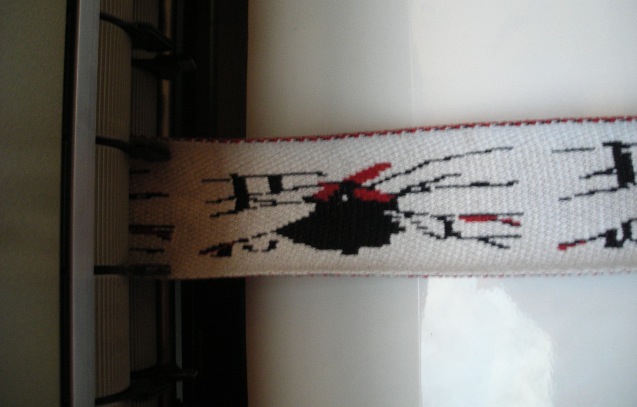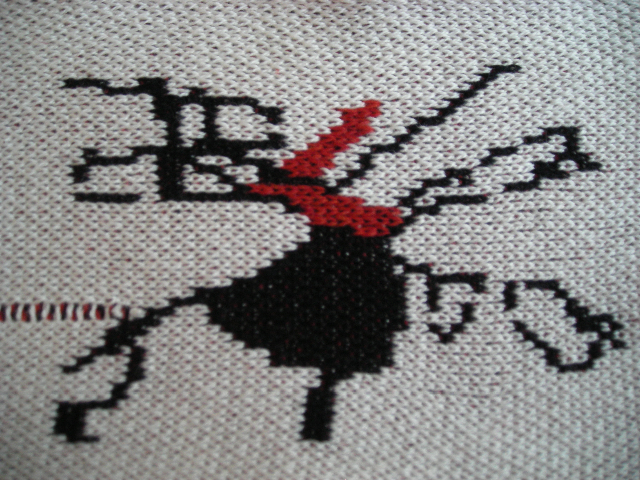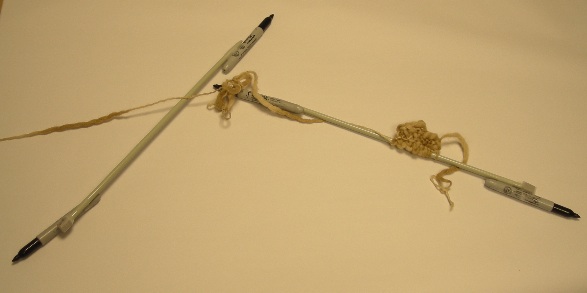



Rachel Beth Egenhoefer considers her Commodore 64 Computer and Fischer Price Loom to be defining objects of her childhood. She creates tactile representations of cyclical data structures in candy and knitting and is currently researching the intersection of textiles, technology, and the body.
Events at HTTP >
Other Related Events >
Rachel Beth will be working as an Artist in Residence at HTTP, Furtherfield’s Gallery and lab space in April 2008. She has been brought to UK from San Francisco as part of the Distributed South initiative, which is a network intended to raise awareness of the considerable activity in media arts in South of UK. Through residencies and collaborative events co-curated by SCAN and Space Media, Distributed South seeks to develop and build collaborations and networks in media arts and all are welcome to take part. Egenhoefer’s residency consists of several key parts – experimental studio time to create new work at the University of Brighton, presenting workshops and lectures across the south of England, a commissioned exhibition at Lighthouse Brighton, all culminating with time spent in residence at Furtherfield.


Currently Rachel Beth is working in the studio on ideas comparing tactile knitting to intangible computer code and how the body interacts and moves with both. In addition to building a knit zoetrope, casting the space between body and machine in candy, she has also been tracking the motion of knitting needles in both physical and virtual space and knitting with the Nintendo Wii. Her time at Furtherfield will be used to continue exploring these ideas while interacting with the larger community and audiences Furtherfield brings.

Higher Education Student Day
Wednesday April 15, 1:00-4:00pm
Rachel Beth will present her work and professional practice from the residency to higher education students
This event is free however advanced booking is necessary.
Networking Event and Residency Closing Party
Configurations: Technology and Textiles Networking Afternoon
25 April, 3.30 – 6pm, HTTP Gallery (Booking essential)
You are invited to share ideas, discuss and develop future working around art work that investigates the relationship between new technology, traditional making techniques and transformative political actions. Anna Dumitriu, Ele Carpenter, Nicola Naismith and Rachel Beth Egenhoefer will present their work using diverse approaches to the making of work using new technology alongside textiles, followed by a “Long Table Discussion”.
The “Long Table Discussion” is an experimental public forum developed by performance artist Lois Weaver. It is a hybrid performance, installation and roundtable discussion designed to facilitate informal conversations on serious topics encouraging everyone to contribute. Previous “Long Table Discussions” include conversations on Women and Prisons, Human Rights and Performance and Manufacturing Bodies.
This event is free however advanced booking is necessary. To book places please email Aaron, visibilityATfurtherfieldDOTorg.
Closing Party for Rachel Beth Egenhoefer 6pm – 9pm (all welcome): Party to celebrate the close of Rachel Beth Egenhoefer’s residency at Furtherfield/HTTP Gallery and providing an opportunity to discuss her work and experiences during the residency.
Rachel Beth Egenhoefer’s residency and Configurations is part of Distributed South an initiative co-curated by SCAN and Space Media. The residency and event is funded by the Arts Council England, University of Wales, University of Brighton, Lighthouse Brighton with support from Furtherfield.org, Textile Futures Research Group (TFRG) and University of the Arts London.
71, Ashfield Rd, London N4 1NY
Click here for map and location details
Distributed South www.distributedsouth.org.uk
www.rachelbeth.net
www.elecarpenter.org.uk
www.nicolanaismith.co.uk
www.annadumitriu.co.uk
Candy & Code
Institute of Contemporary Art (ICA) London _Textile Futures Research Group
Monday March 17, 2008, 6:30-8:30pm
Presentations from Rachel Beth Egenhoefer, Barbara Rauch & Nicola Naismith
Following by a panel discussion with the artists and Dr Jane Harris, Director of TFRG, Helen Sloan, Director of SCAN.
Exhibition of New Work
Lighthouse Brighton
March 20- April 5, 2008
Opening Reception: Thursday March 20, 6:00-9:00pm
Talk on Residency and Distributed South (with Rachel Beth Egenhoefer and Helen Sloan) with an opportunity to view the exhibition: Thursday March 27, 7:30pm, doors open at 7
Rachel Beth’s residency for Distributed South is funded by the Arts Council England, University of Wales, University of Brighton, Lighthouse Brighton and supported by SCAN, Space Media, Furtherfield.org, Textile Futures Research Group (TFRG) and University of the Arts London.
Featured image: abstract animated visual models working from the audio samples of couples engaging in sexual activities.
Frequency Love is a net art piece, not in the networked sense but conceptually filled to the brim with a net consciousness, a net object. This visual deviation playfully captures the dark side of the Internet and its globally collective and obsessive mannerist activities. It reveals a psychological nuance of the everyday Internet sexual experience.
The source material were originally sound files – mp3’s, consisting of couples copulating. Amateurs submitting and declaring their intimately entwined, feral and visceral exertions for other interested parties to hear and enjoy online. Chris Webb abstracted the audio, the data and transformed them into what now are animated gif images of couples having sex.
There is a contradiction at play built by circumstance, that such esoteric interests of sharing intimate, sexual sound files in virtual private clubs do tend to exude. The inevitable occurs. If the multitude of surfers, search hard enough on the net, they collect hidden information by hook or crook somehow; which is part of the nature of using the Internet medium.
When viewing these works it is as though they are breathing, as if they are real souls, real people, even though you know that they are invented visuals, data into sound. Then you remember that they were real people, but mutated into visual form. The ‘Plexus’, culmination of networked, linked individuals expressing proclivity and what seems an uncontrollable hunger to communicate in a way other than by words, via the motion of sexual intercourse in audio format. There has been a global shift of people exploring new territories regarding their own relational selves. The term virtual is essence of the Internet medium and we used to think that this word stood for the unreal, untouchable but now we know that this is no longer applicable. It is now part of our everyday experience, therefore real.